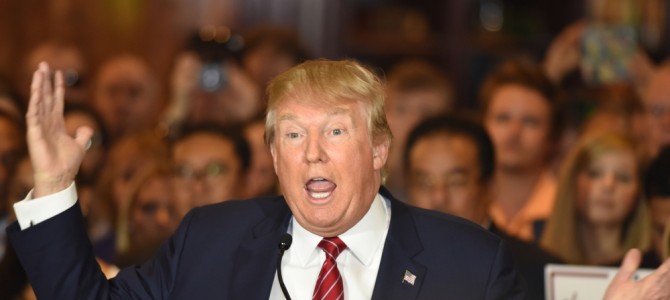
In a meeting with The Washington Post editorial board Monday, Trump revealed five members of an emerging foreign policy team chaired by Sen. Jeff Sessions (R-Ala.) that includes Keith Kellogg, Carter Page, George Papadopoulos, Walid Phares, and Joseph Schmitz.
The names represent a mix of former Pentagon officials, private-sector executives, analysts, and academics who, taken as a whole, are likely to lend Trump some measure of respectability—partly because they share so few of Trump’s outspoken opinions on foreign policy. Unlike Trump, none of them have been outspoken in their opposition to the Iraq and Afghanistan wars, or called for diminished involvement in NATO, or suggested that U.S allies should pay for protection.
Above all, Trump has repeatedly emphasized a non-interventionist view of American foreign policy, decrying what he calls “nation-building” and arguing that we spend too much on foreign aid and should instead invest more resources on domestic infrastructure.
Those views contrast sharply with those held by some of his advisers. Schmitz, a former inspector general at the Department of Defense during the Bush administration and later general counsel at the private security firm Blackwater Worldwide, in 2014 helped coordinate a failed effort by a private group to supply the Free Syrian Army with weapons to fight the Assad regime and defend against extremist groups like ISIS.
Schmitz thought the Obama administration’s plan to support the rebels was insufficient, and tried to arrange for the delivery of 70,000 Russian-made assault rifles and 21 million rounds of ammunition to the rebels, financed by a Saudi prince. The plan was ultimately stopped by the CIA, but it’s clear that, at least in Syria, Schmitz supports more, not less, U.S. involvement. He wrote in November that Congress should declare war, “one way or another,” not only on ISIS but also on the Muslim Brotherhood, arguing that the Obama administration is in denial about the global jihadist threat facing America.
Another Trump adviser, Walid Phares, doesn’t seem to share Trump’s controversial views about Muslims in the Middle East. Although Phares, a Lebanese Christian academic, was smeared by liberals media outlets as an “Islamophobe” and an extremist while working as an advisor to the Romney campaign in 2012, he has written on many occasions about the need for the United States to reach out to Muslim liberals in the Middle East to counter jihadism, and specifically to work with moderate Sunnis to push back ISIS without ceding ground to Iranian-backed militias. That’s one of the central arguments of his 2010 book on the struggle for freedom in the Middle East, and it sounds a lot like what Jeb Bush said in criticism of Trump’s Muslim ban during the debates.
In the end, it might not matter how much Trump agrees with these advisers. After all, last week Trump said he primarily consults himself on foreign policy, and for months he dodged questions about who his advisers were, fueling speculation that in fact he had no advisers. Even though he has now named a few, it’s hard not to conclude that Trump’s many strong positions on foreign policy—that he would seize oil from enemies in the Middle East, force Japan to pay vast sums for protection from China, abandon Ukraine to Putin’s revanchist schemes—come from Trump himself, and not a panel of expert advisers.
It’s easy to see why many foreign policy experts would be reluctant to sign on to the Trump campaign. In fact, earlier this month dozens of prominent Republican national security experts signed an open letter declaring their opposition to a Trump presidency, arguing that a Trump administration “would use the authority of his office to act in ways that make America less safe, and which would diminish our standing in the world.”
As the primaries drag on and Trump moves to consolidate support for the GOP nomination, some parts of the GOP establishment will no doubt begin reconciling themselves to Trump. There are some indications that this is already happening.
For foreign policy experts, who tend to be careerist and sensitive to their reputations, this presents an especially difficult choice. Trump’s opinions about America’s role in the world are so far outside the mainstream that signing onto his campaign could meant the end of an adviser’s career. It would be like a professional economist endorsing Trump’s call for a trade war with China—no serious expert could do it with a clear conscience.
Since Trump is unlikely to find foreign policy experts that share his outdated nationalism, it remains to be seen what role these advisers will play other than to allow Trump to say he’s talking about foreign affairs to someone other than himself.









